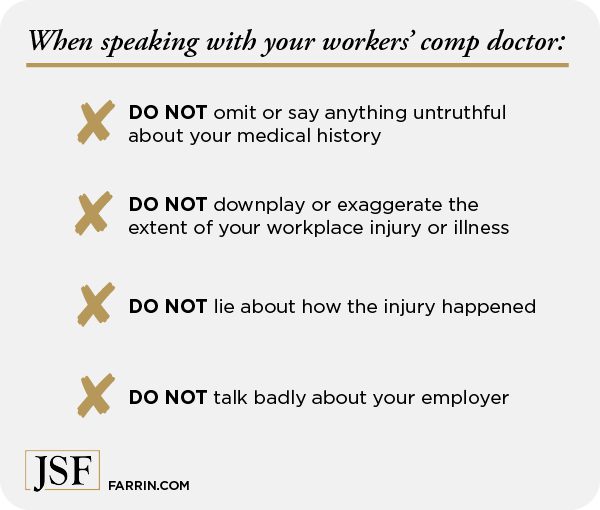Workers’ compensation provides medical care and lost wages to eligible workers who are hurt on-the-job. However, the workers’ comp system is complicated, and it involves many parties all trying to protect their own interests, including medical providers, the insurance company, and your employer.
The medical provider, or workers’ compensation doctor, plays an especially important role in your recovery: prescribing your treatment plan and recommending when and if you can return to work, and with what restrictions.
It’s important to know that, in workers’ comp, your employer’s insurance company chooses the doctor you see. Therefore, it is vitally important that you don’t say anything to the workers’ comp doctor that may negatively affect your claim.
As a workers’ compensation attorney, I have heard many unfortunate stories of an injured worker inadvertently hurting his claim by saying the wrong thing to his workers’ comp doctor. Sometimes it’s a misremembered detail. Other times, it’s an exaggeration the worker mistakenly thought would help his claim.
Regardless of the intent, what these workers said impacted their cases negatively. To try to spare you the same outcome, I have highlighted the four things you should never say to your workers’ compensation doctor.
#1 – Do Not Omit Something Important or Say Anything Untruthful About Your Medical History
Maintaining credibility is extremely important to the outcome of your workers’ comp claim.
Be upfront and honest about past injuries and pre-existing conditions. In most cases, the insurance company will have access to your prior medical records. Therefore, it is better to be truthful about whether you have had problems in the past with the body part you just injured at work. It will damage your credibility if you say you’ve never had a problem in the past and then they read otherwise in your medical records.
Omissions and false statements will only cloud the picture and paint you as dishonest – and can even be grounds for a claim denial. Consult with a workers’ comp attorney for help in demonstrating how the issues you are dealing with now are a direct result of your recent work accident.
#2 – Do Not Downplay or Exaggerate the Extent of Your Workplace Injury or Illness
It’s important to be honest about your symptoms, pain level, and functional limitations. If your doctor does not have a realistic set of facts about your work-related injury or occupational illness, he or she could misdiagnose your condition and may not be able to give you proper medical care.
- If you downplay your injury, your doctor may prematurely declare that you are ready to return to work or not designate the right work restrictions for when you return. You could also miss out on needed time off work to heal.
- If you exaggerate your condition, the tests and diagnostics that the doctor requests may reveal any false representations and make the doctor skeptical that you’re truly injured.
I have seen an insurance company point to a single example of exaggeration to call into question everything else the injured worker said and deny their claim. For example, if you tell the doctor you are having 10 on a scale of 1-10 pain at every appointment, the insurance company may suspect that you are trying to make your injury sound worse than it really is. Do not give the insurance company any reason to doubt your account of your condition and symptoms during this time.
#3 – Do Not Lie About How the Injury Happened
Workers’ compensation is a no-fault system, so you are usually eligible for benefits if you follow the proper reporting procedures, even if you were responsible for the accident. (Note: there are some exceptions to this rule, such as if you were intoxicated or under the influence of drugs at the time of your accident).
Don’t lie about what happened in your workplace accident, but do not admit fault or blame anyone either. Just be honest about the details without assigning responsibility.
A Side Note About North Carolina
It’s important to note that in North Carolina, you generally don’t have a claim if you just start “hurting” at work. Your pain or injury has to be caused by an accident or some unexpected occurrence. The only exception is back injuries, which can happen without a specific accident.
A common question many claims adjusters will ask is, “Were you doing your normal job in a normal way when you were hurt?” People instinctively think that the right answer is yes, but if you answer yes to this, they may try to deny your case as not being the result of an accident.
Learn More: Back Injury Benefits and Settlements
#4 – Do Not Talk Badly About Your Employer
Because workers’ comp is a no-fault system, if your employer was responsible for your injury or illness (for example, did not provide up-to-date safety gear or failed to maintain an uncluttered environment), the workers’ comp system still generally protects the employer from being sued by injured workers for negligence.
So, while it may anger you if your employer’s negligence was responsible for your injury, it does your claim no good to speak poorly of your employer to your workers’ comp physician. Instead, you could be perceived as holding a grudge and maybe even trying to game the system to get back at your employer. If your doctor grows suspicious and reports you, the insurance company may withdraw your workers’ compensation benefits.
Be Upfront in Your Independent Medical Exam, Too
Sometimes, your employer’s insurance company will ask for an independent medical exam (IME) once your treating physician has declared that you have reached maximum medical improvement (MMI) or to resolve questions about your medical condition. This happens often when there’s a dispute with the insurance company about:
- what medical treatment you need
- when you can return to work
- what work restrictions you should have
- or whether you have a permanent disability
The outcome of this exam can affect your workers’ compensation claim and how much you may receive in benefits. The above rules about what not to say to your workers’ comp doctor also apply to your IME doctor. I always counsel my clients to be honest with their doctors because it’s critical to receiving the correct care, as well as to building your claim.
We Can Help You With Your Workers’ Compensation Claim
At the Law Offices of James Scott Farrin, our workers’ comp team is made up of experienced attorneys and paralegals who are committed to fighting for injured workers to receive all the benefits and compensation to which they may be entitled.
Several of our attorneys have taught seminars for other workers’ comp attorneys, and several of our attorneys and paralegals previously worked for insurance companies. That means we know firsthand what you are up against, and how to fight back in your best interests.

Most importantly, our team will put you first. I encourage you to check out our You-First Policy, then call us at 1-866-900-7078 for a free case evaluation.
It’s time to tell them you mean business.





